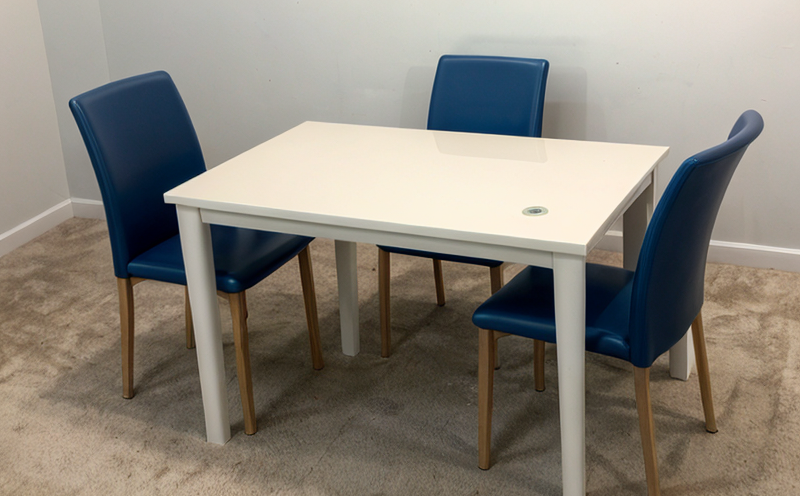NF EN 12719 Resistance to Hot Objects Testing of Plastic Furniture Surfaces
The NF EN 12719 standard is a crucial part of the European Union’s stringent safety regulations for furniture and interior plastics. This testing ensures that plastic surfaces in furniture are resistant to damage from hot objects, such as cigarettes or tea cups, which can pose potential hazards if they come into contact with people.
The primary goal of this test is to evaluate how well the surface materials withstand exposure to heat without catching fire or causing burns. This is particularly important for items like armchairs, tables, and sofas that are frequently used in homes and public spaces. Compliance with NF EN 12719 helps manufacturers ensure their products meet legal requirements and can be trusted by consumers.
The test involves subjecting a sample of the plastic surface to heat from a hot object for a specific duration. The temperature of this object is typically set at around 50°C, which corresponds closely to the average temperature of a cigarette ember or a hot beverage. After the exposure period, the sample undergoes inspection to determine if any damage has occurred. Damage includes melting, discoloration, or deformation that could compromise the integrity and safety of the furniture.
Manufacturers who follow this standard ensure not only regulatory compliance but also enhanced product quality. By incorporating NF EN 12719 into their quality control processes, they can reduce risks associated with potential injuries from hot surfaces in furniture products. This testing is vital for maintaining a high level of safety and trustworthiness among consumers.
Compliance with this standard requires careful preparation of the test samples, precise measurement of temperature and exposure time, and rigorous inspection after the test. Quality managers, compliance officers, and R&D engineers play key roles in ensuring these processes are executed accurately to meet the stringent requirements set by NF EN 12719.
| Parameter | Description |
|---|---|
| Sample Preparation | The sample should be a representative piece of the plastic surface, cut to standard dimensions. |
| Hot Object Temperature | A hot object at 50°C is used for testing. |
| Contact Time | The contact time with the hot object varies based on the specific type of furniture and its intended use. |
Understanding these parameters is essential for any organization involved in producing or inspecting plastic furniture to ensure compliance with NF EN 12719. The testing process is not only about meeting legal standards but also about enhancing product safety and user confidence.
Industry Applications
- Furniture manufacturing: Ensuring the durability of plastic surfaces in furniture like armchairs, tables, and sofas.
- Home decor: Verifying the safety of decorative items that may come into contact with hot objects.
- Public spaces: Assessing the resistance of seating areas in libraries or waiting rooms to protect against accidental burns.
Customer Impact and Satisfaction
The NF EN 12719 test significantly impacts customer satisfaction by enhancing safety standards for furniture products. By ensuring that the plastic surfaces do not catch fire or cause burns, this testing builds trust between manufacturers and consumers. It reassures customers that they are purchasing safe products that meet international standards.
Customers value this service because it provides peace of mind knowing that their furniture is designed to withstand accidental hot object contact without compromising safety. This level of assurance translates into higher customer satisfaction, leading to repeat purchases and positive brand loyalty. Compliance with NF EN 12719 also enhances the reputation of manufacturers who adhere to stringent quality control measures.
For businesses, this service can be a competitive advantage as it demonstrates their commitment to safety and quality. In an increasingly litigious society, such adherence shows that they are proactive in addressing potential risks associated with hot object contact on furniture surfaces.
Environmental and Sustainability Contributions
The NF EN 12719 test contributes positively to environmental sustainability by promoting the use of safer, more durable materials. By ensuring that plastic furniture does not catch fire or cause burns, manufacturers can extend the lifespan of products, reducing waste and resource consumption. This aligns with broader sustainability goals by encouraging the development and use of sustainable materials.
Additionally, compliance with this standard helps in minimizing accidents related to hot object contact on furniture surfaces, which could lead to unnecessary medical interventions or product replacements. By preventing such incidents, manufacturers can contribute to reducing healthcare burdens and waste generation associated with such accidents.





